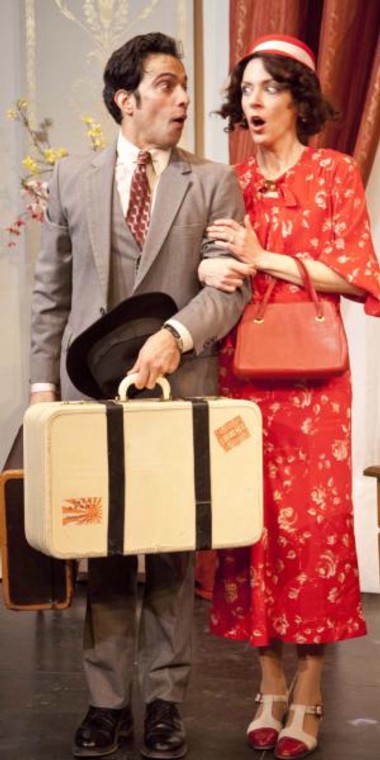It’s not surprising that Private Lives is one of Noël Coward’s two most-performed plays, nor that A Song at Twilight isn’t the other one. The former is an exquisite marital farce—the master of acerbic wit at the height of his powers—the latter a ruminative late-life piece in which flashes of that trademark wit are all but lost in sentiment and social comment.
Both plays involve the complications that ensue when long-separated couples unexpectedly meet again—pesky ghosts from the past upending the comfortable present (as a real ghost does in Blithe Spirit, Coward’s other most popular play). But there the similarities end.
A Song at Twilight, playing through this weekend at Hartford Stage, is a meditation on age, reputation and lost love. It’s also the work in which Coward most forthrightly addresses “the love that dare not speak its name.” Written in 1966, when being gay was still criminal in Britain, the play was modelled on the carefully closeted and ruthlessly protected homosexuality of W. Somerset Maugham, with not a few echoes of Coward’s own meticulously cultivated persona. In it, Sir Hugo Latymer, a world-famous writer, is visited by an old flame (female), bearing two packets of love letters, one possibly embarrassing, the other potentially incriminating.
Having not seen the play before, I was looking forward to this change of pace from the Coward wit parade. Sadly, pace is only one of the problems in this production. The play is formed around two long conversations, heavy on exposition, often redundant and self-conscious about its serious theme.
Longtime Hartford Stage artistic director Mark Lamos returns to guest-direct. My impression of his work here was one of striking stage pictures and actors largely left to their own devices. In this one, where the actors need to enliven the rather ponderous script, the two leads only serve to drag it down. Sir Hugo is elderly and ailing, and so, you would think, is Brian Murray, who often seems sick and tired to the point of indifference. As his younger, vivacious visitor, Gordana Rashovich, with metallic hair and a voice to match, is more shrill than lively, with the result that it’s hard to work up any sympathy for either character.
Thank goodness for the supporting cast! Mia Dillon is sharp, amiable and, yes, witty as Sir Hugo’s wife of convenience, and Nicholas Carrière makes an amusingly Jeevesian waiter. Two more performers appear, uncredited—a pair of near-naked young men who entwine behind a tantalizing scrim in a reverie of Sir Hugo’s that most certainly wasn’t in the original production.
Private Lives combines Coward’s effervescent wit with no-holds-barred slapstick, and the production playing all this month at Shakespeare & Company is everything you could wish to season the end-of-winter days with laughter. The 1930 comedy of romantic fisticuffs turns on the reunion of a couple who divorced amid continuous brawling, now honeymooning with new, dull spouses but irresistibly drawn back together, not least by the love of brawling.
It’s a perfectly crafted farce, served up perfectly by Tony Simotes and a perfect cast. David Joseph and Dana Harrison are, okay, perfectly matched as the scrappy lovers, he the unflappable debonair suddenly flapped by his exhilarating ex, she slinky in red satin and red in tooth and claw when on the attack, both of them hugely enjoying the fray. As the combative couple’s ill-chosen newlyweds, Adam Huff is agreeably stuffy and Annie Considine girlishly insipid, and Lily Cardaropoli does a droll turn as an acidic French maid.•
Chris Rohmann is at StageStruck@crocker.com and his StageStruck blog is at valleyadvocate.com/blogs/stagestruck.



